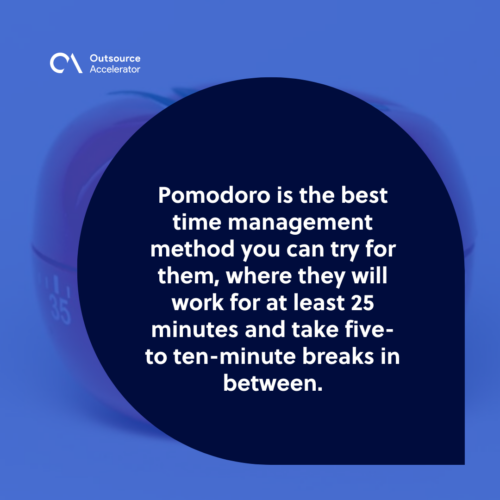10 project management hacks to boost your team’s performance

Project management is a critical skill for any business, as staying organized and on top of tasks can be challenging anytime. It has become crucial with the rise of project-based functions delegated to service providers worldwide.
The Project Management Institute (PMI) projected that employers would need 88 million people to accomplish project-related roles by 2027.
However, most projects still fail to be executed despite the efforts made. Research shows that roughly 35% of projects worldwide are executed successfully. One reason for this involves poor or outdated project management.
Fortunately, there are a variety of project management hacks that can help your team stay organized and productive.
In this article, learn about these hacks and how to overcome the challenges in implementing them.

The importance of good project management
Lack of management practices makes your entire project unorganized. A team lacking good project management is even a waste of time for their clients and stakeholders.
It as well costs businesses more – around US$260 billion, according to a 2021 Cost of Poor Software Quality report.
Good project management keeps everyone on page, from the stakeholders to the clients. It helps to ensure that the project is completed on time and that it is completed within the budget. It also ensures the following aspects are not overlooked:
- Productivity. With good project management, business leaders can point out productivity challenges and how to solve them.
- Maximum efficiency. Good project management helps teams manage their timeline and available resources most efficiently.
- Risk management. At the same time, good project management also anticipates project risks better, making it easier for businesses to mitigate them on time.
- Safety and compliance. Moreover, good project management ensures safety and security throughout the process while monitoring compliance with applicable laws and regulations.
10 project management hacks for your team’s performance
Project management is not as easy as anyone thinks. It requires strong leadership and the entire team’s participation and cooperation to complete a project successfully.
Luckily, there are easy and organized ways to improve your team’s performance further. Here are ten project management hacks you can apply to your next project.
1. Establish goals, objectives, and action plans
Your project will more likely fail when you do not set concrete goals, objectives, and action plans.
Always define realistic goals and objectives before you start working on the project. Communicate with your client to learn the entire project’s scope and details, from their expectations to the resources you will use.
Identify the things you should prioritize and what aspects should be in different stages of your project. This gives you a clear picture of how the project will run through its entirety.
2. Practice efficient workload management
Efficient workload management maximizes your team’s productivity and helps you prevent further bottlenecks in every project step.
You don’t have to employ a single way to manage workloads. Depending on your strategy, you can assign and track tasks through the following methods:
- RACI Chart. The RACI matrix is a form of responsibility assignment matrix that lists all project roles categorized as responsible, accountable, consulted, or informed.
- Agile methodologies. Agile is a set of methodologies that break down the entire project into several phases, typically involving continuous feedback and improvements in its lifecycle.
- Lean method. The lean method aims to streamline project processes and minimize waste of time, resources, and workflow.

3. Automate using project management tools
Using multiple project management tools is usual for all teams. You only have to maximize them to save time and effort on your part.
You can automate repetitive tasks using your existing tools through integration, whether in-app or third-party. Tools such as Asana and Trello allow integrations with communication, calendar, and collaboration apps to help you keep everything in one place.
Meanwhile, IFTTT and similar applications can further organize your external integrations.
4. Communicate regularly with team members
You can easily monitor project progress and backlogs with your tools. However, you could lose track of your “whys” and “hows” without enough team communication.
Regularly reach out and check up on your team regarding their progress. Engage with them through catch-ups, small talks, and other ways to communicate in person or remotely.
This helps you get to know your team members, including their challenges in accomplishing a task and how they can be solved.
5. Provide constant training
Your team will find difficulty performing their tasks with the lack of proper training.
Make it a point to provide continuous training to your team, especially when introducing new tools and processes. You can schedule short sessions at their most convenient time, whether online or in person, and structure your training to engage them better.
6. Learn to say “no” sometimes
Sometimes, turning down a few changes protects you and your team from unnecessary burnout and work overload.
Learn to say “no” professionally and confidently, especially when you know it can drastically affect the project. When in doubt, review your entire project and timeline to see if the client’s suggestions realistically fit your current action plan.
That said, balance out and see the adjustments you can make as well to meet your clients halfway.
7. Take breaks
Studies show that the most productive and motivated employees[1] take breaks in between.
No matter how hectic your deadlines are, your team cannot always work productively for eight hours straight. You would need constant short and long breaks to recharge and regenerate your attention span simultaneously.
This goes the same with your teammates. Encourage them to take short breaks at work. Pomodoro is the best time management method you can try for them, where they will work for at least 25 minutes and take five- to ten-minute breaks in between.

8. Adjust your processes as needed
Adjustments are necessary depending on the progress you are making. With this, you should be able to adjust your processes as needed.
This goes the same when something does not work with your team, whether in workload, tools, or process flow. Experiment with what would work best for your strategies and adapt to them accordingly.
9. Encourage collaboration and feedback
Accomplishing tasks with your team is more manageable with collaboration and constant development.
Encourage collaboration and growth by creating a safe space for team members to share their ideas and opinions. It is also important to provide clear guidelines and expectations for how team members should interact with each other.
This can include setting ground rules for respectful communication, constructively providing feedback, and encouraging team members to listen to each other.
10. Celebrate wins, whether small or large
Achieving milestones regardless of their size is a win for you and your team. Celebrate them and recognize the hard work of each team member in achieving them.
Celebrating wins and recognizing their effort further helps motivate your employees to always give their best.
Challenges in applying project management hacks to your team
Challenges would normally arise when applying project management hacks to your team. This includes the following.
- Scope creep. Clients could insist on adding “extra” changes more often, affecting the initial timeline, resources, and workload.
- Insufficient risk management. Some “what ifs” of the project could be overlooked or ignored, causing you to face further mishaps and last-minute adjustments.
- Lack of accountability. Every team member should be personally accountable for each task, or else the project will fail.
- Limited stakeholder engagement. At the same time, the stakeholders or management team could be out of touch with the project, causing problems between your client and team.
Staying organized and on track is the best way to make your project work. Stick with deadlines, track progress often, and communicate with stakeholders to help your team get the best outcome possible.
It is also essential to be flexible and open to change. As the project progresses, the plan may need to be adjusted to accommodate new challenges or opportunities.
Look for tools that allow integrations with communication, calendar, and collaboration apps to help you keep everything in one place.
You may consider monday.com’s Work OS platform, which centralizes all work, processes, and tools into one intuitive, AI-enabled system, enabling teams to build, run, and scale their workflows and projects.







 Independent
Independent




